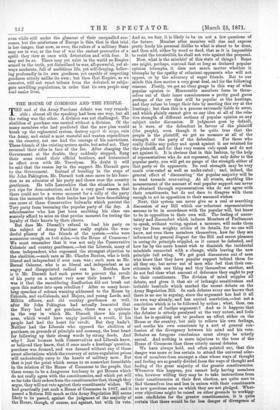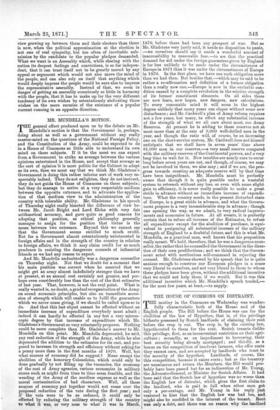THE HOUSE OF COMMONS AND THE PEOPLE.
THE end of the Army Purchase debate was very remark- able ; almost all the speaking had been one way, but all the voting was the other. A division was not challenged. The abolition of purchase was carried without a division. Of the many members who had predicted that the new plan would break up the regimental system, destroy esprit de corps, ruin the Army, and entail a most wasteful and wanton expenditure on the country, not one had the courage of his convictions. These friends of the existing system spoke, but acted not. They reversed their rifles in face of the foe. After charging the Government at the double, they suddenly stopped, flung their arms round their official brothers, and fraternized in effect even with Mr. Trevelyan. No doubt it will be said that the reason lay in the support Mr. Disraeli gave to the Government. Instead of treading in the steps of Sir John Pakington, Mr. Disraeli took once more to his func- tion as an educator of his party and threw over the country gentlemen. He tells Lancashire that the situation is not yet ripe for demonstration, and for a very good reason, that there could not be a worse moment for a rally of the party than the moment when their leader has just been demolishing one more of those Conservative bulwarks which prevent the Tory party from becoming the popular party of the day. A schoolmaster who has just been snubbing his class can scarcely afford to seize on that precise moment for testing the loyalty of their hearts by their cheers.
But does Mr. Disraeli's refusal to lead his party on the subject of Army Purchase really explain the won- derful pliancy of the friends of the system,—who were numerous enough on both sides, in the House of Commons ? We must remember that it was not only the Conservative Colonels and country gentlemen,—but the Liberals, many of them independent, who expressed the strongest objection to the abolition,—such men as Mr. Charles Buxton, who is both liberal and independent if ever man was ; such men as Mr. Bernal Osborne, who is as liberal and independent as an
angry and disappointed radical can be. Besides, how is it Mr. Disraeli had such power to prevent the revolt of his party on a matter very near their hearts ? How was it that the smouldering disaffection did not break out upon this matter into open rebellion ? After so many hour- long speeches of solemn warning addressed to the House by Colonels, and ex-Colonels, and Majors, and young Lords, and Militia officers, and old country gentlemen as well, after Sir John Pakington had actually lamented that the Navy had not got purchase, there was a cynicism in the way in which Mr. Disraeli threw his people over, which would have amply justified a revolt, if his people had had the heart for revolt. But they hadn't. Neither had the Liberals who opposed the abolition of purchase, on grounds of principle and economy, the least heart for following up their strong words by strong deeds. And why f Just because both Conservatives and Liberals knew, or believed they knew, that if once made a hustings' question, purchase was doomed, and was doomed without any of those sweet alleviations which the recovery of extra-regulation prices will undoubtedly carry to the hearts of military men. But that is just the point which seems to us somewhat formidable in the relation of the House of Commons to the people, that there seems to be a dangerous tendency to get Houses which do not. really agree with the constituencies, and which yet will so far take their orders from the constituencies that, though they argue, they will not vote against their constituents' wishes. We had practically just such a House of Commons in 1867, and it passed a Reform Bill much as this Army Regulation Bill seems likely to be passed, against the judgment of the majority of the House, though, of course, not against, but with its vote.
And so, we fear, it is likely to be on not a few questions of the future. Member after member will rise and express pretty freely his personal dislike to what is about to be done, and then add, either by word or deed, that as it is impossible to resist the irresistible, he shall not vote against the proposal.
Now, what is the mischief of this state of things ? Some one might, perhaps, contend that so long as declared popular opinion triumphs, it does not much matter whether it triumphs by the apathy of reluctant opponents who will not oppose, or by the advocacy of eager friends. But to our minds this does matter a very great deal, and for the following reasons. Firstly, we get no clear gauge in this way of what popular opinion is. Honourable members form to them- selves out of their inner consciousness a pretty good guess perhaps of the cry that will be popular at the hustings, and they refuse to tempt their fate by meeting this cry at the hustings ; but then this is a process extremely liable to error, and which plainly cannot give us any idea at all of the rela- tive strength of different sections of popular opinion on any subject under discussion. If judgment goes by default, as it were, of the defendant in favour of the plaintiff (the people), even though it be quite true that the people is the plaintiff, we get no measure at all of the strength of the party of the defendant. For those who really dislike any policy and speak against it are retained for the plaintiff, and for that very reason only speak and do not act against it. It is obvious that in this fashion, by the help of representatives who do not represent, but only defer to the popular party, you will get no gauge of the strength either of that party or its opponents. Its real strength may be very much over-rated as well as under-rated • and, indeed, the general effect of discounting' the popular majority will be to tend towards over-rating. At all events, anything like measurement of the amount of real popular support can never be obtained through representatives who do not agree with their constituents, but do not dare to disagree with them enough to act in opposition to their assumed wishes.
Next, this system can never give us a real or searching discussion of any Bill which our -reluctant representatives assume to be in accordance with the popular will, but know to be in opposition to their own will. The feeling of uncer- tainty and discomfort which induces Members of Parliament to speak, without voting, against a measure, will make them very far from weighty critics of its details, for no one will know, not even these members themselves, how far they are influenced by general disgust for the Bill and secret pleasure in seeing its principle crippled, as it cannot be defeated, and how far by the mere honest wish to diminish the incidental mischiefs connected with a change, while leaving the new principle full swing. We get good discussions out of men who know that they have popular support behind them for all they say, but never out of men who feel that their con- stituents wish one thing and they themselves another, and do not feel clear what amount of deference they ought to pay to their constituents. The division of mind cripples all debate, and gives it that air of lethargic sensitiveness and irritable lassitude which marked the recent debate on the Army Regulation Bill. In such debates every one knows that there is no use in arguing, since the argument has had it all its own way already, and has carried conviction,—but not a conviction which is to be followed by action ; what, then, can be the use of further argument ? And so it happens that the debater is utterly paralyzed at the very outset, and feels that he is speaking not to produce an effect either on the House or the country, but only to relieve his own feelings, and soothe his own conscience by a sort of general con- fession of the divergency between his mind and his vote. Debates on foregone conclusions must always be utterly unreal. And nothing is more injurious to the tone of the House of Commons than these utterly unreal debates.
We have always held, and often pointed out, that this danger was more or less certain to attend the universal selec- tion of members from amongst a class whose ways of thought and feeling are so greatly divided from the ways of thought and feeling of the great majority of the greater constituencies. Whenever this happens, you cannot help having members who, however willing they may be to take instructions from their constituencies at their first election, are quite sure to find themselves less and less in unison with their constituents as new questions arise on which they are not pledged. What- ever objections might be raised on other grounds to workipg- men candidates for the greater constituencies, it is quite certain that there would be far less danger of divergence of view growing up between them and their electors than there is now, when the political approximation at the election is not one of real sympathy, but too often of inevitable sub- mission by the candidate to the popular pledges demanded. What we want is an Assembly which, while sharing with the nation its deepest feelings and convictions, is so far indepen- dent, that it can trust itself not to be greatly moved by any appeal or argument which would not also move the mind of the people, and can also rely on itself that anything which would deeply impress the people would be sure also to impress the representative assembly. Instead of that, we seem in danger of getting an assembly consciously so little in harmony with the people, that it has to make up for the very different tendency of its own wishes by ostentatiously abdicating those wishes on the mere surmise of the existence of a popular current running in an opposite direction.



































 Previous page
Previous page